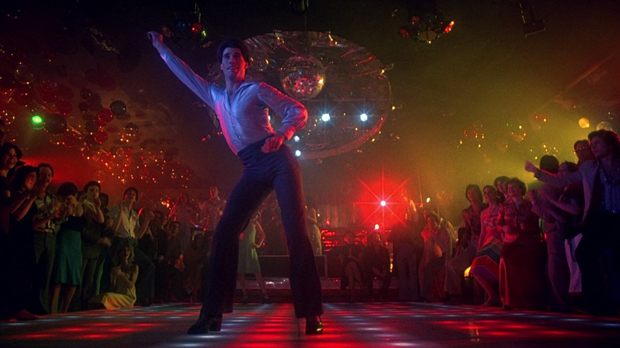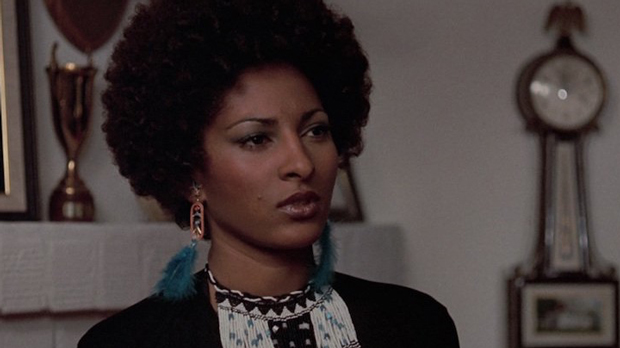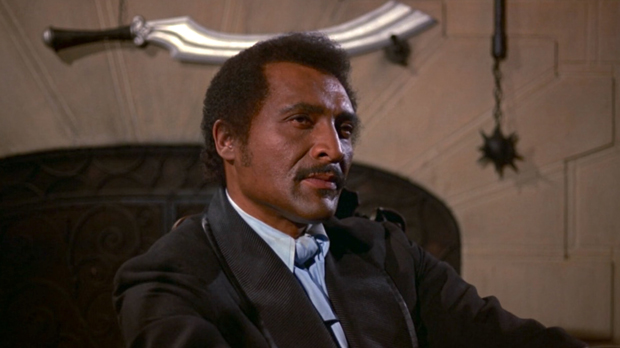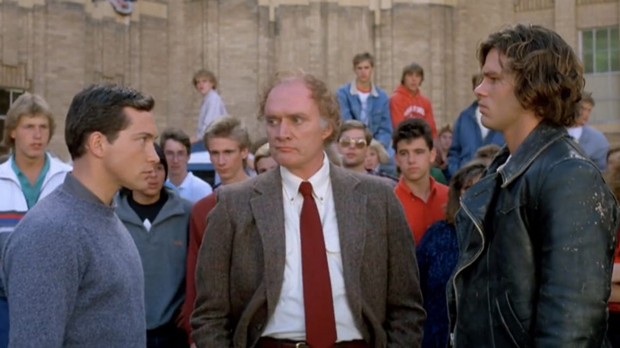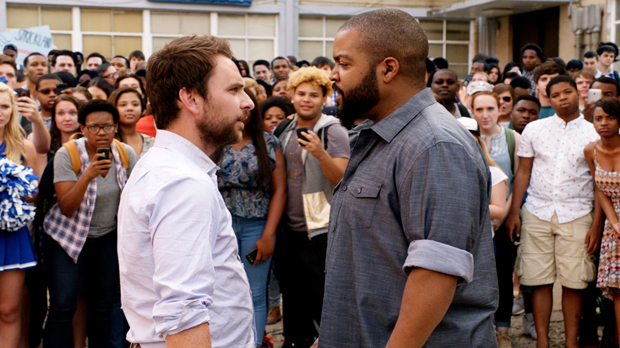 Saturday Night Fever (1977) Paramount/Drama RT: 118 minutes Rated R (pervasive language throughout including crude sexual references and racial epithets, strong sexual content including attempted rape, nudity, drug and alcohol use, some violence, thematic elements) Director: John Badham Screenplay: Norman Wexler Music: David Shire and The Bee Gees Cinematography: Ralf Bode Release date: December 16, 1977 (US) Cast: John Travolta, Karen Lynn Gorney, Barry Miller, Joseph Cali, Paul Pape, Donna Pescow, Bruce Ornstein, Julie Bovasso, Martin Shakar, Val Bisoglio, Sam Coppola, Nina Hansen, Lisa Peluso, Denny Dillon, Bert Michaels, Monti Rock III, Fran Drescher. Box Office: $121M (US)
Saturday Night Fever (1977) Paramount/Drama RT: 118 minutes Rated R (pervasive language throughout including crude sexual references and racial epithets, strong sexual content including attempted rape, nudity, drug and alcohol use, some violence, thematic elements) Director: John Badham Screenplay: Norman Wexler Music: David Shire and The Bee Gees Cinematography: Ralf Bode Release date: December 16, 1977 (US) Cast: John Travolta, Karen Lynn Gorney, Barry Miller, Joseph Cali, Paul Pape, Donna Pescow, Bruce Ornstein, Julie Bovasso, Martin Shakar, Val Bisoglio, Sam Coppola, Nina Hansen, Lisa Peluso, Denny Dillon, Bert Michaels, Monti Rock III, Fran Drescher. Box Office: $121M (US)
Rating: ****
Every decade has that one movie that really speaks to and defines the current young generation. The list goes as follows: Rebel Without a Cause (the 50s), Easy Rider (the 60s), The Breakfast Club (the 80s), Clueless (the 90s), and Mean Girls (the 00s). You’ll notice that I didn’t mention the 70s. That was on purpose because that movie is the subject of this review. Of course, I’m speaking about Saturday Night Fever, the movie that brought disco into the international spotlight and made a huge star out of John Travolta.
It’s an excellent movie, no question about it. It’s the first movie that I remember vehemently arguing with my parents about seeing. As a young fan of disco music AND movies, I really wanted to see it in the worst way, but they wouldn’t budge an inch. I eventually received a copy of the soundtrack (GREAT ALBUM!), but their refusal to take me to see the movie was insurmountable. I finally got to see it in early ’79 when Paramount released a PG-rated version of the movie. I didn’t get to see the uncut R version until November ’85 when I caught it on cable TV one night. I will NEVER again watch the PG version. It’s like drinking watered-down vodka; it doesn’t have the same impact as the real thing. The “bad stuff” in Saturday Night Fever– the non-stop profanity, the strong sexual content, the drugs- adds a sense of realism to this coming-of-age drama about an Italian-American teenager/young man living in the Bay Ridge section of Brooklyn.
Tony Manero (Travolta) lives for Saturday night. That’s when he goes out with the guys to the local discotheque where he’s the king of the dance floor. It’s the one place where he actually feels like he’s somebody. He works a dead-end job in a paint store during the day. He still lives with his family who can’t seem to do anything but criticize him. His father Frank (Bisoglio, Quincy M.E.) has been out of work for nine months and his mother (Bovasso, Moonstruck) keeps wondering why he can’t be more like his older brother Frank Jr. (Shakar, The Children), the priest.
One night, Tony spots a beautiful girl at the discotheque and decides that she’d be the ideal partner for an upcoming dance contest. Forget that he already asked a neighborhood girl Annette (Pescow, Angie) to dance with him. He wants to get with Stephanie (Gorney), a more sophisticated and mature woman. She realizes right away that they’re from different worlds, but agrees to dance with him in the contest on the condition that their relationship doesn’t extend beyond the dance floor. In other words, no sex.
Life at the Manero household takes a turn for the worse when Frank Jr. comes home and announces that he’s leaving the priesthood. It devastates the mother who turns around and blames Tony for his decision. He becomes so wrapped up with his own stuff that he doesn’t see that one of his pals, Bobby C. (Miller, Peggy Sue Got Married), is having a mental collapse. He’s distraught over his girlfriend’s pregnancy and doesn’t know how to properly handle this situation. At one point, he even asks Frank Jr. if the Pope would give him a special dispensation for his girlfriend to get an abortion.
As his relationship with Stephanie progresses, Tony starts to realize that he’s outgrowing his Bay Ridge surroundings and the racial tensions that plague his neighborhood, specifically the hatred towards the Puerto Ricans. He’s also had enough of his overly macho friends- Bobby C., Joey (Cali, The Lonely Lady), Double J (Pape), and Gus (Ornstein)- and their juvenile behavior (check out the scene in White Castle).
The night of the big dance contest becomes a turning point in Tony’s life. He’ll be faced with the monumental decision of “crossing the bridge” into adulthood. Obviously, the Verrazano-Narrows Bridge serves as a symbol for this crucial time in Tony’s life, it connects Brooklyn (childhood) and Manhattan (adulthood). As the guys play climbing games on the bridge like it’s a set of monkey bars, they’re also teetering on the edge of adulthood.
Based on “Tribal Rites of the New Saturday Night,” a 1976 New York Magazine article by Nik Cohn, Saturday Night Fever (thank God for the title change!) has everything going for it. Directed by John Badham (Blue Thunder, Stakeout), it’s one of the very best movies about growing up. It perfectly captures the free-wheeling attitudes prevalent in the disco scene of the pre-AIDS 70s (plenty of casual sex and drugs). Travolta delivers the best performance of his career. He’s completely believable as a confused young man who slowly realizes that there’s life outside of Bay Ridge. Pescow turns in a powerful performance as the good girl who loves Tony. She’ll do anything for him even though he treats her like dirt. Sadly, her feelings for Tony end up getting her into a bad situation.
Saturday Night Fever has one of the best opening title sequences that I’ve ever seen. It shows Tony strutting down the street as “Stayin’ Alive” by The Bee Gees plays on the soundtrack. WOW! Great stuff! In fact, it’s one of the best soundtracks of all time featuring several songs from The Bee Gees- “How Deep Is Your Love”, “Night Fever”, “More Than a Woman”, “You Should Be Dancing” and “Jive Talkin’”- as well as other hit singles like “If I Can’t Have You” (Yvonne Elliman), “A Fifth of Beethoven” (Walter Murphy), and “Disco Inferno” (The Trammps). In addition to everything else, who doesn’t love that white polyester suit Tony wears for the dance competition?
Saturday Night Fever is worth seeing for many reasons. It’s a culturally significant movie that provides 21st century viewers with an authentic look at a past decade, one without cell phones and Facebook. Its soundtrack features real music, not the pre-fabricated garbage that passes for music today. I highly recommend that you see this movie if you haven’t already, just don’t bother with the terrible 1983 sequel Staying Alive. I might review that one in the future just for fun.
